|
|
|
Sort Order |
|
|
|
Items / Page
|
|
|
|
|
|
|
| Srl | Item |
| 1 |
ID:
185263
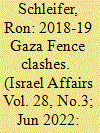

|
|
|
|
|
| Summary/Abstract |
This article examines the violent clashes between Hamas and Israel along the Gaza Fence (30 March 2018–27 December 2019) from a psychological operations (PSYOP) perspective. It shows how Hamas managed, through a skilful combination of mass riots, media manipulation, and quick adaptation to changing circumstances to subvert the strategic priorities of the Israel Defence Forces (IDF), wear down Israeli morale, and erode Israel’s sovereignty in its southern region – all this while deterring Israel from launching a large-scale military operation in Gaza. As such, the Gaza Fence clashes provide an example of a PSYOP-based strategy that can be applied to other border conflict zones, such as Morocco, Saudi Arabia, Mexico, and Islamist insurrections.
|
|
|
|
|
|
|
|
|
|
|
|
|
|
|
|
| 2 |
ID:
190047
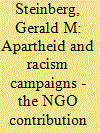

|
|
|
|
|
| Summary/Abstract |
Under the headings of promoting human rights and international law, the influential network of non-governmental organisations (NGOs) has been a central actor in the political war targeting Israel though allegations of apartheid and racism. In applying these slanders, the NGOs systematically erase the history of the Arab-Israeli conflict, including decades of warfare and terrorism, and join in the attempt to delegitimize the nation-state of the Jewish people, regardless of borders, and as distinct from criticism of Israeli policies regarding territory occupied in the 1967 war. This process constitutes the essence of post-Holocaust or ‘new antisemitism’, as included in the consensus working definition published by the International Holocaust Remembrance Alliance. The NGO campaigns are constructed on the foundations established by the Soviet and Islamic blocs culminating in the 1975 UN ‘Zionism is racism’ resolution. This theme was revived in the NGO Forum of the 2001 Durban Conference, led by Human Rights Watch, Amnesty International, and Palestinian groups such as Al-Haq, and used to justify appropriating the methods of the South African anti-apartheid campaign, including boycotts and lawfare. After the Durban conference and for 20 years since, this NGO network continued and expanded the campaign based on the apartheid and racism allegations. Their claims were amplified in media platforms, international bodies, anti-Israel church groups and on university campuses in the form of ‘Israel apartheid weeks’. European governments enabled activities of the Palestinian and Israeli NGOs through substantial funding, estimated at 120 million Euros annually. In 2020 and 2021, the NGO emphasis on these themes increased, led by HRW, and supporting the decision of the ICC prosecutor to accept jurisdiction over Palestinian claims and to open investigations against Israel. This context amplified the potency of the allegations of apartheid and racism in attempts to demonise Israel.
|
|
|
|
|
|
|
|
|
|
|
|
|
|
|
|
| 3 |
ID:
142756
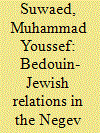

|
|
|
|
|
| Summary/Abstract |
On the foundation of the first Jewish settlements in the Negev, at the start of the 1940s, the Bedouins welcomed the Jewish settlers. The local personal connections and mutual acquaintance between them created a feeling of closeness. The symbiosis of daily life and mutual help in the fields of personal needs, from medicine to transport, replaced their mutual fears.
However, two factors quickly changed this attitude. The first was a severe drought, which struck the Negev in the winter of 1947, and brought with it a difficult economic situation, followed by several robberies and disputes, and damage to property. The second factor was the incessant encouragement given by the leaders of the Palestinian National Movement to the Bedouins to join the struggle against the Jewish population, especially after the UN decision in November 1947, that is, after the partition of Palestine and the inclusion of the Negev within the borders of the Jewish state.
Most of the Bedouins joined the Palestinian National Struggle. Friends of yesterday became today's enemies. The years 1947–1949 were a period of anarchy, which continued well into the 1950s. In this period the State of Israel was established. Consequently, the Jewish population in the Negev was no longer the party responsible for the relationship with the Bedouins, as the Israeli government took its place. Also contact between neighbors was reduced after the Bedouins were evacuated toward the ‘fence’ region, in the Beer-Sheva Valley. The freedom the Bedouins enjoyed before the war did not exist anymore.
|
|
|
|
|
|
|
|
|
|
|
|
|
|
|
|
| 4 |
ID:
086958
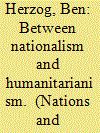

|
|
|
|
|
| Publication |
2009.
|
| Summary/Abstract |
The public and researchers alike view global/humanitarian and local/national logics as based on different, and even contradictory, regimes of justification. In this paper, however, I argue that these logics are complementary in the case of refugees. By asking 'who is a refugee?' within the Israeli case study, I empirically ground the claim that nationalism and humanitarianism should be grasped as Glocal. Content analysis of the Israeli case reveals how the Israeli establishment 'translates' the universal notion of humanitarianism. Humanitarian discourse does not offer an answer to the refugee problem by invoking a universal identity, nor is it just a euphemism for particularistic interests. On the contrary, the humanitarian logic is in fact based on the national order, and does not attempt to replace it. The political meaning of the term 'refugee' is an endless transcription of the national logic, and thus cannot be cosmopolitan.
|
|
|
|
|
|
|
|
|
|
|
|
|
|
|
|
| 5 |
ID:
113992
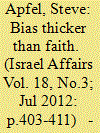

|
|
|
|
|
| Publication |
2012.
|
| Summary/Abstract |
There are several paradoxes in the propaganda war against Israel. The most puzzling of them perhaps would be the way many Christian groups and churches side with the Palestinians. On the evidence one would expect the opposite. Believing Christians have every logical reason to be pro-Israel, where alone in the Middle East Christendom's holy sites are protected; where Christians may pray openly; and where Christian followers face no pressures to convert. On the Palestinian side none of those freedoms exist. How in that case can one explain groups like the Presbyterians, the World Council of Churches, Christian Aid and so forth aiming their missiles at the Jewish state? Bringing together religious doctrine, life-preserving motives and naked bias, this article seeks to provide answers to the paradox of Christianity against Christian-friendly Israel.
|
|
|
|
|
|
|
|
|
|
|
|
|
|
|
|
| 6 |
ID:
193475
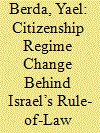

|
|
|
|
|
| Summary/Abstract |
This article delineates the relations between the judicial overhaul launched by Israel’s right-wing government in 2023 and the mechanisms of Israel’s control over Palestinians, demonstrating that they are two parts of a regime change. The essay traces a series of changes in Israel’s citizenship regime the past decade: the enactment of an anti-terrorism law and a nation-state law that defined the exclusive right of Jews to self-determination in Israel; the domestic application of surveillance and control practices developed in the occupied territories; and finally legislation allowing the revocation of Palestinians’ citizenship and the de facto annexation of the occupied territories.
|
|
|
|
|
|
|
|
|
|
|
|
|
|
|
|
| 7 |
ID:
133709
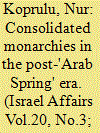

|
|
|
|
|
| Summary/Abstract |
The Arab monarchies remain relatively stable, largely unaffected by the 'Arab Spring' upheavals. In particular, the Hashemite Kingdom of Jordan has emerged relatively unscathed from the region's uprisings. The Jordanian case helps underscore the extent to which the polarization between Palestinian-Jordanians and native Jordanians continues to dominate the nature of public debate and political reform. While initially the 'Arab Spring' generated a spirit of cooperation between these two communities with calls to tackle unemployment culminating in demands for democratization, the persisting schism between them resurfaced when public debates on electoral law commenced. This article analyses the roots and ramifications of the 'Arab Spring' in Jordan, as well as the resilience of the kingdom to the nascent social upheavals.
|
|
|
|
|
|
|
|
|
|
|
|
|
|
|
|
| 8 |
ID:
153234
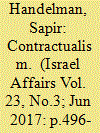

|
|
|
|
|
| Summary/Abstract |
How do we create an effective change in situations of intractable conflict where ordinary people are at the centre of the struggle? Distinguishing between top-down contractualism and bottom-up contractualism, this article presents the South African peace process of the 1990s as an example of top-down contractualism. In contrast, it raises the question as to whether bottom-up peace-making contractualism can emerge in the Israeli–Palestinian case.
|
|
|
|
|
|
|
|
|
|
|
|
|
|
|
|
| 9 |
ID:
175136
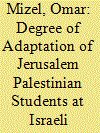

|
|
|
|
|
| Summary/Abstract |
Several international and local studies have indicated that Arab students face specific difficulties in adapting to and integrating into Israeli colleges. This research aims to identify and analyze the adaptation difficulties faced by Palestinian students in academic colleges in Israel. The research sample consists of Palestinian freshmen from different schools and neighborhoods in East Jerusalem who are studying at a college in West Jerusalem. In-depth interviews were used to document and analyze the experiences and challenges of these students on campus. The interviews revealed a number of factors that impede students’ adaptation and their academic success, and they can be grouped under the concepts of culture shock, language barriers, isolation, and transportation. To deal with these difficulties, students used different strategies such as piety, withdrawal, dependency, and distancing. Implementing specific programs to consider and address specific social and cultural aspects of Palestinian students’ difficulties may contribute to reducing the alienation and culture shock they face in college, such as introducing programs on life skills and treatment of others, hiring faculty who are capable of understanding the Palestinian cultural context and introducing qualified Arab staff in the administrative and service departments.
|
|
|
|
|
|
|
|
|
|
|
|
|
|
|
|
| 10 |
ID:
113996
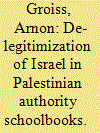

|
|
|
|
|
| Publication |
2012.
|
| Summary/Abstract |
De-legitimization of Israel as a sovereign state and denial of the Jews' rights, indeed of their legitimate presence in Palestine in both antiquity and today, have been the cornerstone of the Arab position since the onset of the Middle East conflict. Even the peace agreements between Israel and some of its neighbours - Egypt (1979), the PLO (1993), Jordan (1994) - have not changed this attitude, as starkly illustrated by schoolbooks of the nations concerned. This essay describes the depiction of the Jewish state in Palestinian Authority (PA) schoolbooks in comparison to Arab, Iranian, and Israeli textbooks.
|
|
|
|
|
|
|
|
|
|
|
|
|
|
|
|
| 11 |
ID:
171676
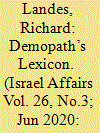

|
|
|
|
|
| Summary/Abstract |
This article examines a double discourse by the Palestinian leadership, one in English and one in Arabic, which plays a central role in their negotiating strategy with Israel since the onset of the Oslo ‘peace process’ (1993). Using language very close to Western terminology, Palestinians in English speak of ‘Occupation’ and ‘Settlements’ with the 1967 borders as the defining issue; while in Arabic, they speak of ‘Occupation’ and ‘Settlements’ in terms of the 1948 borders (i.e., all of Israel is an ‘Occupation’ and Tel Aviv is an illegal ‘settlement’). As a zero-sum negotiating strategy this makes perfect sense: convince Israel to concede ‘land for peace’ (1967 borders), when in reality this means ‘land for war’ (1967 borders as launching pad for war to 1948 borders). The western news media, allegedly committed to accurate reporting, shows no knowledge of the Arabic discourse and presents what Palestinians say in English as reliable reflections of their actions and intentions. As a result of this failure to identify the double-discourse, the Western legacy media presents Palestinian war propaganda as news to their Western audiences, unwittingly helping the Palestinians in their deception.
|
|
|
|
|
|
|
|
|
|
|
|
|
|
|
|
| 12 |
ID:
113116
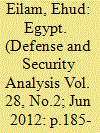

|
|
|
|
|
| Publication |
2012.
|
| Summary/Abstract |
The new government in Egypt will have to deal with the following challenges in its foreign policy: the Palestinians, Sinai, the arms race between Israel and Egypt, the nuclear issue, the Suez Canal, and the Tiran Straits. Egypt has to decide what its approach would be toward these issues and as to how to maneuver between its own interests and those of other states such as Israel and the USA. All the sides have to consider their steps carefully in order to avoid an unnecessary crisis.
|
|
|
|
|
|
|
|
|
|
|
|
|
|
|
|
| 13 |
ID:
170948
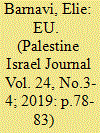

|
|
|
| 14 |
ID:
085343
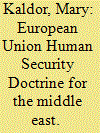

|
|
|
|
|
| Publication |
2008.
|
| Summary/Abstract |
The Barcelona and Madrid reports1 proposed that the European Union (EU) adopt a human security doctrine to guide its defense and foreign policy. Because the EU is not a nation-state, but a new kind of supra-national organization, it requires a security policy that is distinct from traditional national security policies. Human security, according to these reports, refers to:
|
|
|
|
|
|
|
|
|
|
|
|
|
|
|
|
| 15 |
ID:
160076
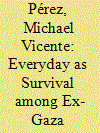

|
|
|
|
|
| Summary/Abstract |
This article examines the role of repetition in the making of everyday life among ex-Gaza refugees in Jordan. It argues that the quotidian struggles of stateless ex-Gazans challenge theories of the everyday that align repetition with domination and creativity with resistance. I suggest that the ability to repeat ordinary activities in work and at home possesses its own form of agential effort: Survival. Concerned with the existential struggles of stateless refugees, I argue that the mundane repetitive practices of everyday life in a precarious situation can enable various opportunities for subjective stability and the promise of a better life in an unstable world.
|
|
|
|
|
|
|
|
|
|
|
|
|
|
|
|
| 16 |
ID:
164750
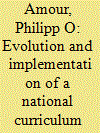

|
|
|
|
|
| Summary/Abstract |
Can a nation mobilizing for an extended armed conflict also construct and implement a national educational curriculum? This article explores the complex and crucial case of the Palestine Liberation Organization (PLO) as it sought to develop a national curriculum while in exile in Lebanon during the 1970s, prior to the inception of the Palestinian National Authority. Based on previously unexamined primary sources from PLO archives, I show how the PLO accomplished a high level of curriculum maturity despite considerable contextual and institutional challenges. The PLO mainstream embraced this curriculum as a political instrument of anticolonial and postdiasporic education suitable for regenerating a sense of community, fostering nation building, and increasing the PLO's political legitimacy. However, as can be expected in a colonial or diasporic setting, the process of educational transition remained uneven, fragile, and dependent on the PLO leadership's ability to navigate conflicts and negotiate arrangements with colonial power, host states, and international organizations.
|
|
|
|
|
|
|
|
|
|
|
|
|
|
|
|
| 17 |
ID:
087016
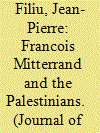

|
|
|
|
|
| Publication |
2009.
|
| Summary/Abstract |
François Mitterrand, the longest-serving French president in history, never ceased to be a passionate advocate of Israel, in contrast to his Gaullist predecessors. But he was also the most committed to Palestinian statehood, and among the earliest to insist on the PLO's full engagement in the peace process, often at considerable cost to his ties with Israel. By the time Mitterrand left office in 1995, France's Middle Eastern role had greatly declined, with the United States having assumed full control of the peace process; during the 1980s, however, its contributions had been significant. This article examines Mitterrand's fourteen-year presidency and the paradoxes of his Middle East policy.
|
|
|
|
|
|
|
|
|
|
|
|
|
|
|
|
| 18 |
ID:
151822
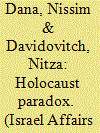

|
|
|
|
|
| Summary/Abstract |
While Holocaust denial existed even during the Holocaust itself, this phenomenon has substantially expanded and diversified over the past decades. This ranged from the advent of technologies that shifted the debate to new platforms and forums, to Israel’s comparison to Nazi Germany, to Islamist-driven Holocaust denial and anti-Semitism on European streets. Paradoxically, concurrently with the intensification of Holocaust denial by Arabs and Muslims, they have made massive use of Holocaust symbols, language, and discourse in their national struggle. This article presents this paradox ‒ Arab Holocaust denial and Holocaust memory manipulation ‒ in an attempt to identify ways and means to address this phenomenon against the backdrop of the Arab‒Israeli conflict.
|
|
|
|
|
|
|
|
|
|
|
|
|
|
|
|
| 19 |
ID:
103230
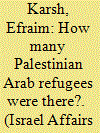

|
|
|
|
|
| Publication |
2011.
|
| Summary/Abstract |
The number of Palestinian Arabs fleeing their homes during the 1948 war has constituted one of the most intractable bones of contention of the Arab-Israeli conflict, not least since the Palestinians have insisted on the 'right of return' of these individuals and their descendants to territory that has long been part of the state of Israel. At the end of the war, the Israeli government set the number of Palestinian refugees at 550,000-600,000; the British Foreign Office leaned toward the higher end of this estimate. But within a year, as large masses of people sought to benefit from the unprecedented influx of international funds to the area, some 962,000 alleged refugees had been registered with the newly-established UN Relief and Works Agency (UNRWA). More than a half-century later, these exaggerated initial numbers have swollen still further: as of June 2000, according to UNRWA, the total had climbed close to 3.75 million, though it readily admits that the statistics are largely inflated. For its part the PLO set a still higher figure of 5 million refugees, while Israel has unofficially estimated the current number of refugees and their families at closer to 2 million. Using a wealth of declassified Arab, Israeli, and British documents, this article seeks to provide as comprehensive and accurate an estimate as possible of the actual number of refugees in the wake of the 1948 war.
|
|
|
|
|
|
|
|
|
|
|
|
|
|
|
|
| 20 |
ID:
177572
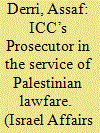

|
|
|
|
|
| Summary/Abstract |
The International Criminal Court has been recently called upon by the Court’s Prosecutor to decide a highly unusual application, to approve its jurisdiction over the State of Israel which has not acceded to its Statute. The Prosecutor asks the Court to apply to Israel a special legal standard, openly discriminating it in comparison with other states. The Prosecutor’s submission consciously deviates from established theories on the Israeli-Palestinian conflict in favour of unfounded contentions which were discussed and rejected by mainstream scholarship, supporting her tautological arguments with references to vague, unauthoritative sources. This article demonstrates that the accumulative weight of all these factors points to the conclusion that the Prosecutor’s submission constitutes in fact a sophisticated action in the service of Palestinian Lawfare against Israel rather than a bona fide legal motion. The consequences of this project, should it be endorsed by the Court, might prove devastative to international law and the present world order.
|
|
|
|
|
|
|
|
|
|
|
|
|
|
|
|
|
|
|
|
|